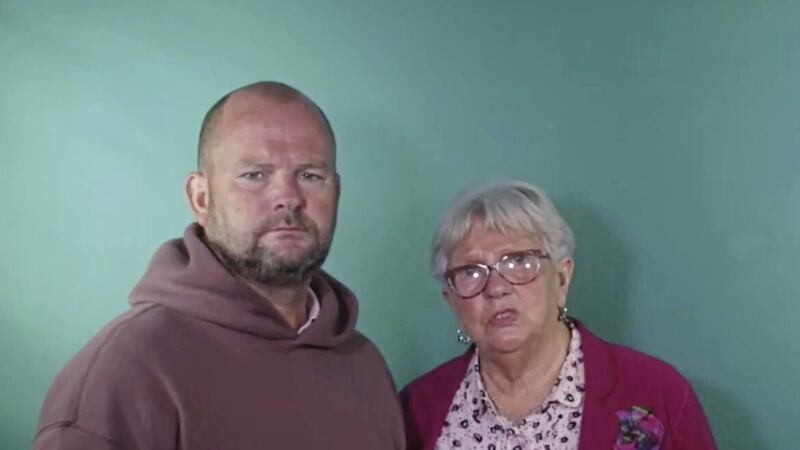Two stories of extraordinary courage have shared the headlines. In Carrickfergus, the family of murder victim Glenn Quinn has defied a UDA death threat. In Dublin, border businessman Eugene Hanratty has been jailed for a 2012 assault on Martin McAllister, who had raised allegations of diesel sludge dumping with the PSNI.
There should be a more honoured place in the public square for such bravery, starting with better support from the police. It took a decade and three trials for Mr McAllister to receive justice. Judges in the first two trials criticised the garda investigator for refusing to give evidence, then for giving poor-quality evidence.
Glenn Quinn’s brother and 78-year-old mother were visited by officers at 10pm, told they had 24 hours to leave Northern Ireland or be shot, then handed a form and a leaflet and asked “where are you going to go?”
Challenged on this by the media, the PSNI said “our priority is keeping people safe”.
**
The secretary of state has cut MLAs’ pay by one third while the next election is delayed for a protocol deal. This is a foolish policy that risks hollowing out fresh talent where it is most needed. Only the DUP deserves the punishment and it is too defiant to care. Sinn Féin can easily afford it. The victims are the SDLP, UUP and Alliance, the latter especially - of the 18 MLAs first elected in May, 11 are Alliance. New MLAs tend to be young and to have put other aspects of their lives on hold. They are the most likely to being driven out of politics by demoralising suspensions and dwindling incomes.
Of course, cutting MLAs’ pay is popular. That should not be a concern at the Northern Ireland Office, where nobody has to get elected in Northern Ireland.
**
Before every round of protocol negotiations, the EU trots out the same line to tilt the pitch: ‘we are flexible and ready to do a deal’. Only in the small print is it explained a deal requires the UK to agree with the EU’s unchanged position. This week has been no exception and while that does not mean there will not be a deal or the EU will not move a little, it must be asked why so much of the media keeps taking this spin at face value. It is hardly difficult to spot.
The latest tired pitch-tilting, from European Commission vice president Maros Sefcovic, is that sea border inspections can be reduced to almost zero. Businesses say inspections are not the problem - it is the cost of filling in paperwork that would make a fully-implemented protocol disastrous. Perhaps the solution, unexpectedly, is more inspections for less paperwork. But that would require more flexibility than Mr Sefcovic is mandated to discuss.
**
DUP MP Ian Paisley has presented a private member’s bill to the Commons that would require a super-majority in a referendum for any part of the UK to secede. It has no chance of becoming law.
“There’s a protocol climb-down in the air and he’s just turned on the smoke machine,” was how the UUP’s Stephen McCarthy explained it.
SDLP MP Claire Hanna accused Mr Paisley of “trolling”. But who is being trolled? Although the North Antrim MP says his bill has the support of leader Sir Jeffrey Donaldson, there has been no statement from Sir Jeffrey. In the past, it has sometimes appeared that when Mr Paisley is not acting with the DUP leadership, he is acting against it.
**
UUP leader Doug Beattie has backed a campaign to reopen the Portadown to Derry railway. This brings history full circle, as the UUP shut the line in 1965 on the promise of a motorway that was never built.
The railway will obviously not reopen and it seems the A5 dual-carriageway will not be built either. Its cost has doubled to £1.6 billion and the Irish government has stalled on the £400 million it promised in the St Andrews agreement. Stormont cannot plug the gap: its capital budget is set to be raided to cover over-spending this year and shortfalls for years to come.
There needs to be some realism about transport projects in rural areas. Railways might be impossible to justify but bus services west of the Bann could be transformed for a fraction of the A5’s budget. Road pricing is another possibility. Tolls helped pay for new motorways in the Republic - and nobody suggests a train to Omagh would not involve buying a ticket.
**
Derry City Council has demonstrated the sort of thinking required. Councillors have approved 260 social houses on an edge of town site on condition the developer provides every address with a bus pass for five years. In return, Translink will extend a service to the area. The developer objected to this as having “no precedent at all”. Planners responded there is a first time for everything and there will be more such schemes in future.
Planning conditions are underused in Northern Ireland, despite open-ended powers to devise them. But a public transport requirement is not unprecedented: Belfast City Council approved a 19-storey apartment building last year on condition residents get a free bus pass for three years.









